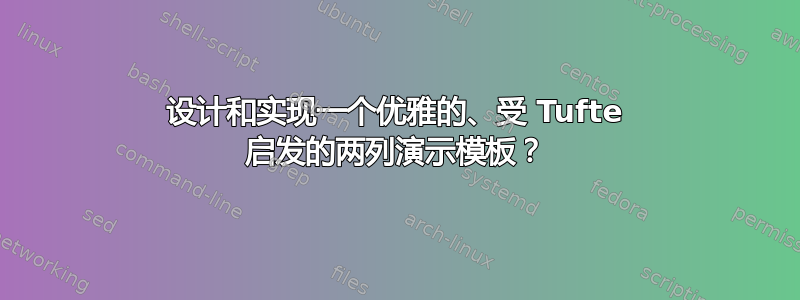
我有兴趣寻找或创建beamer具有以下特征的模板:
- 左图:一个正方形,宽度约为 2/3
- 右侧:右侧每张幻灯片包含两到三条语句以及零到四个小图
我希望模板能够:
- 简化创建演示文稿的过程
- 有效传达信息
我怎样才能实现这些目标?
Sweave(我对(或)集成感兴趣org-mode,但我不希望这分散答案的注意力,因为我可以实现这一点)
例子
带有tufte-notes风格的东西,就像在“Tufte-Handout 样式的使用示例“,如下所示,会非常好,但不清楚如何才能最有效地将这种风格转化为beamer。

我不是设计师,但这是一个模型(图片来自美国宇航局)

答案1
你提到了 org-mode,所以我会对此发表评论。我使用 org-mode 创建的 beamer 演示文稿进行了论文答辩。我遇到过很多情况,一边是图片,另一边是项目符号 - 用图像代替项目符号应该很容易。下面是一个例子,但如果你想看整个演示文稿,我把它放在这里:http://ucolick.org/~cmalone/nolink/defense/
以下是一个例子

附带 org-mode 代码:
** What is an XRB?: Lightcurve
*** 4U 1728-34 :BMCOL:B_ignoreheading:
:PROPERTIES:
:BEAMER_env: ignoreheading
:BEAMER_col: 0.7
:END:
#+ATTR_LATEX: width=\textwidth
./quick3.png
#+BEGIN_LATEX
\begin{tikzpicture}[remember picture,overlay]
\node [yellow,xshift=10pt,yshift=20pt] at (current page.south west) {0};
\node [yellow,xshift=120pt,yshift=20pt] at (current page.south west) {$t$ (s)};
\node [yellow,xshift=225pt,yshift=20pt] at (current page.south west) {32};
\node [yellow,xshift=200pt,yshift=100pt,rotate=90] (L) at (current page.south west) {Luminosity};
\draw [color=yellow,line width=2pt,->] (L.east) -- ++(0pt,50pt);
\end{tikzpicture}
#+END_LATEX
*** 4U 1728-34 :BMCOL:B_alertblock:
:PROPERTIES:
:BEAMER_env: alertblock
:BEAMER_col: 0.4
:END:
- Buring mode sets $\tau_\text{dur.}$
- Inferred ignition column implies \alert{deflagration} $\rightarrow$ subsonic flow
\\
\tiny after \\ Strohmayer, T., et al., \textit{ApJL}, \textbf{469}, L9, (1996)
当导出为 LaTeX ( C-c C-e l) 时,生成的 .tex 文件中的相关部分是:
\begin{frame}
\frametitle{What is an XRB?: Lightcurve}
\label{sec-1-3}
\begin{columns}
\begin{column}{0.7\textwidth}
%% 4U 1728-34
\label{sec-1-3-1}
\includegraphics[width=\textwidth]{./quick3.png}
\begin{tikzpicture}[remember picture,overlay]
\node [yellow,xshift=10pt,yshift=20pt] at (current page.south west) {0};
\node [yellow,xshift=120pt,yshift=20pt] at (current page.south west) {$t$ (s)};
\node [yellow,xshift=225pt,yshift=20pt] at (current page.south west) {32};
\node [yellow,xshift=200pt,yshift=100pt,rotate=90] (L) at (current page.south west) {Luminosity};
\draw [color=yellow,line width=2pt,->] (L.east) -- ++(0pt,50pt);
\end{tikzpicture}
\end{column}
\begin{column}{0.4\textwidth}
\begin{alertblock}{4U 1728-34}
\label{sec-1-3-2}
\begin{itemize}
\item Buring mode sets $\tau_\text{dur.}$
\item Inferred ignition column implies \alert{deflagration} $\rightarrow$ subsonic flow
\end{itemize}
\\
\tiny after \\ Strohmayer, T., et al., \textit{ApJL}, \textbf{469}, L9, (1996)
\end{alertblock}
\end{column}
\end{columns}
\end{frame}
这当然可以被美化,但也许这对你来说是一个起点。


